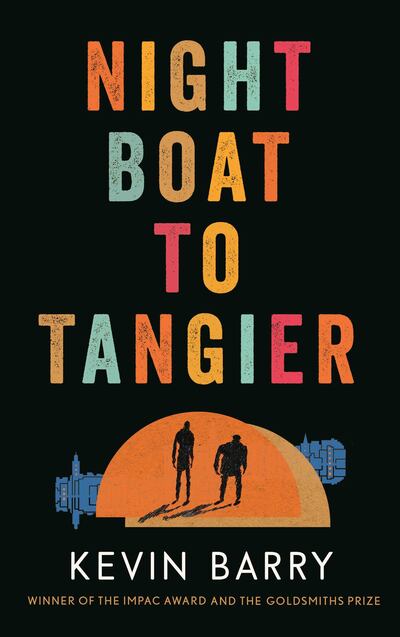Kevin Barry's last novel, the Goldsmiths Prize-winning Beatlebone, was about a man on the move desperate to settle down in an isolated spot far from the madding crowd. The man in question was a fictionalised John Lennon and his tranquil refuge was the island of Dorinish, off the west coast of Ireland, which the real-life musician bought for a song in 1967.
Barry's new novel – the Irish writer's third, which has just been nominated for the Booker Prize 2019 – is a different beast. Night Boat to Tangier centres upon two men who are going nowhere fast and who are unlikely to secure peace of mind in any destination. Charlie and Maurice are a pair of past-their-prime gangsters. After many misspent years of lawbreaking, violence and family pain both at home in Ireland and elsewhere, the men have washed up in the Spanish port of Algeciras. They sit on a bench at the ferry terminal with a battered old holdall looking out for the incoming boat from Tangier. They appear to be on a mission: two smugglers expecting a consignment; two hit men awaiting their victim.
But Barry hasn't written a hackneyed caper about old partners in crime assigned one last job. Charlie and Maurice are finished professionally: "The money now is in people. The Mediterranean is a sea of slaves". Instead, they have embarked upon a more personal mission. The holdall contains not weapons or banknotes, but printed flyers showing the image of a missing girl about 20 years old. They have received a tip-off that she, Dilly, will be on a boat sailing either to or from Tangier. "Three years she's been gone," Maurice says sadly, "and here's me, her old dad, with the heart hangin' sideways out of me chest."
Our sympathies don’t lie with him for long. As he and Charlie stop and question new-age travellers about Dilly’s present whereabouts, their polite pleas give way to menacing threats. Then “the humid air of reminiscence rises”, which leads the men – who are by their own admission, “truly dreadful” – to reflect on the damage and the hurt they have inflicted on themselves and others.
We hear about their time on the run, their addictions and their betrayals. We learn – to our horror – how one of them got a bad leg and the other a bad eye. When the spotlight is on Maurice, he describes his father's descent into madness and replays his relationship with Dilly's mother, Cynthia – a turbulent affair which incited wild paranoia and jealous rages. Recollections and recriminations come thick and fast, until eventually a boat heaves into view, possibly carrying the one person who can offer these yesterday's men a future, or at the very least, a stab at redemption.
Barry’s Charlie-Maurice double-act and absurdist waiting-game invite obvious comparison with Samuel Beckett. However, this electrifying novel is stamped with Barry’s signature. There is the ragged poetry of his prose, as compelling as ever. He captures brilliantly the desolation of the ferry terminal at night (it “reeks of tired bodies, and dread”) and the twinned vibrancy and despondency of the port itself, “one of the unsolvable places of the Earth.”
Barry also ensures there is a rich seam of tragicomedy, plus a constant supply of colourful banter. "Their talk is a shield against feeling," we are told, but in time, Charlie and Maurice wear their bruised hearts on their sleeves as they candidly discuss their first and lost loves, old friends and former stomping grounds, ageing and mortality.
The novel isn't entirely a man's world. Barry allows his reader to see matters from a different perspective by bringing in two female voices. Dilly sifts childhood memories – the callers who dropped in at strange hours, her family's many late-night exits – and reveals why she turned her back on her father and swapped Ireland for a new life in Morocco.
Cynthia pops up in quietly devastating scenes, often to recount the most bitter of breakdowns. “The internecine strife of Maurice and Cynthia,” she muses, taking stock of their years together. “The sleeplessness and pain of the long absences, the hot lurches of emotion, the sudden reversals of fortune, the endless pleadings, the slow relentings … the atrocities on both sides.”
Barry flits between past and present, and when we finally get the whole dramatic picture, it has the power to grip and move. We finish up where we started off, with Charlie and Maurice asking if there is any end in sight. But a lot has happened in between, and it is with reluctance that we take our leave of these flawed and fading men, still “heavy in the bones”, still staring out at the Straits, and forever tormented by their ghosts and demons.


